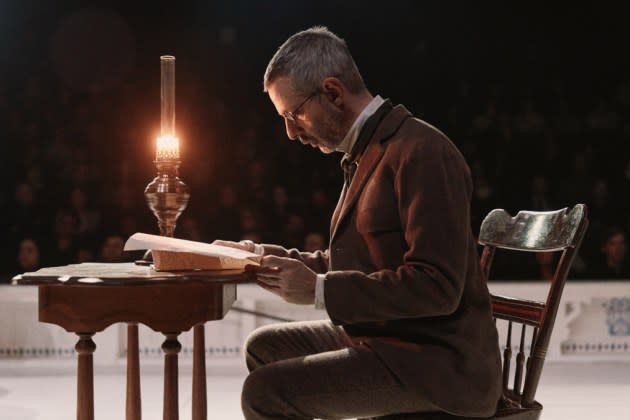‘An Enemy of the People’ Climate Protester Explains Why He Stormed Broadway: ‘As a Movement, You’re Always Playing With What People Think Is Socially Unacceptable’
- Oops!Something went wrong.Please try again later.

The buzzy new revival of Henrik Ibsen’s “An Enemy of the People” has a pivotal scene that takes place in a town hall meeting, during which a crusading doctor, played by Jeremy Strong, warns his community about a looming public health crisis. Over the weekend, during the play’s press previews, three protesters disrupted the show with passionate pleas about a different impending catastrophe — the climate crisis that is warming the planet.
The activists, who included 35 year-old theater actor Nate Smith, interrupted the show three separate times, shouting phrases like”No theater on a dead planet” before one of the stars Michael Imperioli (without breaking character) began pushing them toward the exit.
More from Variety
The protest, put on by the group Extinction Rebellion, received a burst of media attention over the weekend, partly because the show’s star-studded cast unwittingly found themselves at the center of the disruption, and also because their message resonated with the environmental theme of Ibsen’s writing. It wasn’t an accident that much of the audience during the previews were members of the press. Some of these critics panned the protesters for disrupting a production that aligns so closely with their views.
Smith, however, is quick to clarify that the point of the disruption was not to protest against the play itself, but simply to drive attention to the climate crisis.
“The reactions of like, ‘Why aren’t you doing this to the people in charge?’ Like we are doing that all the time. All the time. But how many of those have you heard about in The New York Times?” Smith tells Variety. “The amount of times that I’ve been a part of all kinds of things — from flyering in a park to disrupting a politician’s speech — the amount of times that does not hit the media cycle at all is the strong majority.”
In fact, Smith, a theater actor himself, sympathizes with the experience of the production’s cast and crew. “It pains me so much to know the personal experience for the artists involved in this production and the impact on them. It’s not at all about that.”
Climate activists interrupt tonight’s An Enemy of the People performance. Jeremy Strong stayed in character and for a second I think a lot of us thought it was part of the show. It was not. pic.twitter.com/dV2GpKKsg2
— Riley Ludwig (@riley_ludwig) March 15, 2024
The protest was particularly effective because it occurred during a scene in which many of the actors were sitting among the audience, making it unclear at first whether the demonstration was scripted.
“That was extremely intentional,” says Smith, who “loves the play” and first read Arther Miller’s adaptation of it years ago. “The script keeps pretty faithful to the other versions and we knew this version as well so I had scouted it out and I wove in the first things I said with the lines said in the play, partially to make people confused about what was going on.”
Smith adds that he knew Strong, a method actor, would stay in character during the demonstration, which is why he addressed Strong as his character’s name, Dr. Stockmann, when he first spoke to him. Smith didn’t, however, anticipate that the actors themselves would be the ones to push the protesters out of the theater. “But more power to them,” he says. “They were doing their jobs.”
As for the response to the demonstration, Smith is well aware of, and even understands, the criticism. But he argues that the backlash is exactly the point.
“There’s this strong distinction between movements being liked and movements being effective,” he says. “The reaction is ‘I don’t like this, my belly churns with disapproval of what they’re doing,’ therefore what they’re doing is not helping because I don’t like this. But that is the reaction that all movements get about pretty much everything they do,” he says, listing a long list of successful historical movements, such as the Suffragettes’ first march on Washington and the first picketing demonstration at the White House. “People didn’t like it, people thought they should go home and stay home.”
“And if you tried to have a dinner table conversation about climate change, you’ll see the same thing play out,” he continues. “People shut down, people get pissed, people think you’re holier than thou, people are really scared, we can’t really talk about it. But the majority of people are still very uninformed, and very intentionally uninformed.”
To him, all that matters is that people are talking about climate. “That’s all I’m after,” he says. “Climate being talked about more.”
Best of Variety
From 'The Idea of You' to 'Apples Never Fall': The Best Book-to-Screen Adaptations to Read This Year
Sign up for Variety’s Newsletter. For the latest news, follow us on Facebook, Twitter, and Instagram.
